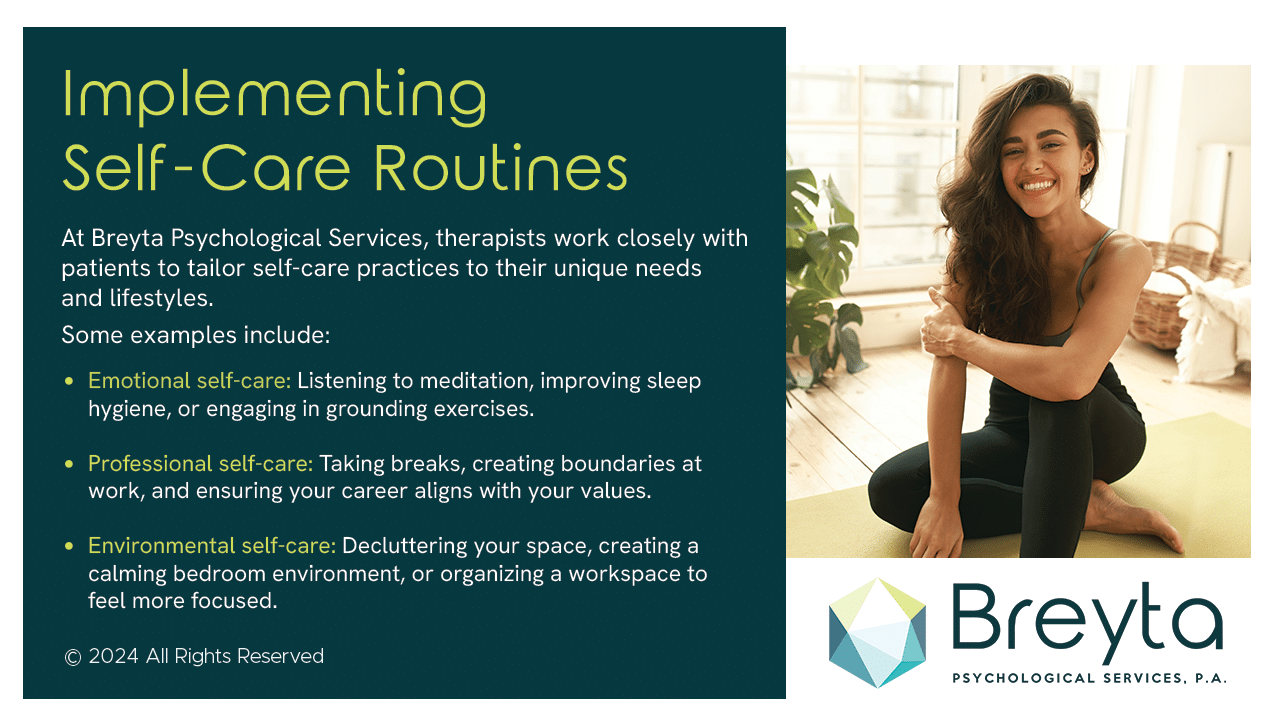Trauma recovery is a journey that requires intention, support, and self-compassion. While professional therapy plays a critical role in healing, incorporating regular self-care practices can enhance your recovery process. Anusha N. Zechella Ph.D., HSP-P, Licensed Psychologist and Clinical Director at Breyta Psychological Services, shares her insights into how self-care can support trauma survivors, why it’s essential, and how it complements therapy.
If you’re suffering with symptoms of trauma, we can help. Connect with Breyta Psychological Services today and start healing.
What Is Self-Care for Trauma?
Self-care is often misunderstood as indulgence or luxury, but Dr. Zechella defines it as something much deeper.
“Self-care is anything that truly makes you feel grounded back in your body and connected to your body,” she explains. “It’s about identifying and honoring unmet needs, especially for trauma survivors who may feel disconnected from themselves.”
For individuals recovering from a disaster or traumatic event, self-care provides a pathway to reconnect with the body, regulate emotions, and build a sense of safety. Complex trauma often disrupts one’s ability to recognize and respond to personal needs, and self-care acts as a bridge to rediscovering that connection.
How Breyta Guides Patients in Implementing Self-Care Routines
Developing a self-care routine can feel overwhelming, especially for a trauma survivor. At Breyta Psychological Services, therapists work closely with patients to tailor self-care practices to their unique needs and lifestyles.
“There are many types of self-care—emotional, mental, financial, professional, social, and environmental,” says Dr. Zechella. “Our goal is to help clients find what resonates with them and make it a daily or weekly practice.”
Some examples include:
- Emotional self-care: Listening to meditation, improving sleep hygiene, or engaging in grounding exercises.
- Professional self-care: Taking breaks, creating boundaries at work, and ensuring your career aligns with your values.
- Environmental self-care: Decluttering your space, creating a calming bedroom environment, or organizing a workspace to feel more focused.
By breaking self-care into manageable steps, Breyta ensures it becomes an achievable and sustainable habit.
How Self-Care Supports PTSD and Emotional Distress Management
For individuals suffering from childhood trauma, Post-Traumatic Stress Disorder (PTSD), or emotional distress, self-care can complement evidence-based therapeutic approaches like Cognitive Processing Therapy (CPT). It addresses the physical and emotional symptoms of trauma while building resilience.
“PTSD symptoms often include hyperarousal, avoidance, re-experiencing, and a shift in worldview,” says Dr. Zechella. “Self-care can help regulate these feelings by grounding you and reconnecting you to your body.”
For instance, engaging in physical self-care such as light exercise or stretching can help reduce hyperarousal, while environmental self-care can improve sleep quality by creating a calming sleep space.
Dr. Zechella highlights the importance of pairing self-care with therapy: “Self-care is one tool in your toolbox. It’s not meant to replace therapy but to support the work you’re doing with your therapist.”
Overcoming Challenges in Practicing Self-Care
One of the most common barriers to self-care is the perception that it’s time-consuming or expensive. For trauma survivors, the idea of adding another task to their already full plate can feel daunting.
“My feedback to patients is: You just haven’t found what works yet,” shares Dr. Zechella. “Let’s start with what you’re already doing and categorize it as self-care. Maybe you already walk your dog for 10 minutes every morning—great, that’s self-care!”
Meeting clients where they are is a core principle at Breyta. Therapists help patients recognize the self-care practices they’re already incorporating and build from there.
Dr. Zechella also emphasizes the importance of keeping self-care simple and accessible: “If it’s too complicated, you’re not going to do it. And that’s okay—it’s just human nature.”
Why Self-Care Shouldn’t Replace Therapy
While self-care is invaluable, it is not a substitute for professional mental health support. Trauma recovery often involves navigating complex emotions and experiences that require the guidance of a licensed therapist.
“Self-care is a supplement to therapy,” says Dr. Zechella. “It’s a way to sustain yourself between sessions and practice the coping skills you’ve learned in therapy.”
Therapy provides a structured and safe environment to address the root causes of trauma, identify triggers, and develop personalized strategies for healing. Self-care, on the other hand, helps maintain balance and resilience in everyday life.
“Think of self-care as part of your mental health toolkit,” adds Dr. Zechella. “It’s an important piece, but you need a professional to guide you through the full process of recovery.”
Practical Self-Care Tips for Trauma Survivors

If you’re new to self-care or unsure where to start, consider these practical tips inspired by Breyta’s trauma-informed approach:
- Start Small: Begin with one manageable practice, like taking a short walk or spending five minutes meditating.
- Be Consistent: Aim to incorporate self-care into your routine daily or weekly, even if it’s just a few minutes at a time.
- Listen to Your Body: Pay attention to what your body needs—whether it’s rest, movement, or nourishment.
- Simplify Your Space: Declutter one area of your home to create a sense of calm and safety.
- Celebrate Progress: Acknowledge the small steps you’re already taking toward self-care and build on them.
How Breyta’s Trauma-Informed Care Supports Healing
At Breyta Psychological Services, self-care is integrated into a comprehensive, trauma-informed approach to therapy. Our mental health professionals are licensed psychologists who help patients deepen their understanding of how trauma affects different areas of their lives — and provide evidence-based tools to support recovery.
“Trauma can touch all parts of your life—emotional, social, professional, environmental,” says Dr. Zechella. “We help clients identify where self-care may be lacking and create a plan to address those areas.”
By combining self-care with therapeutic interventions, Breyta empowers patients to take control of their healing journey and achieve lasting growth. intense
Recover from Traumatic Events at Breyta
Healing from trauma is a multifaceted process that requires both professional support and personal effort. Self-care serves as a powerful tool to help trauma survivors reconnect with their bodies, regulate emotions, and build resilience.
As a mental health professional, Dr. Zechella reminds us: “Self-care is not the whole toolbox, but it’s an important tool. It’s about finding what works for you and making it a consistent part of your life.”
If you’re navigating trauma and seeking support, Breyta Psychological Services can provide the guidance you need. With a trauma-informed approach and a commitment to holistic care, Breyta is here to help you heal your mind and body.
We can help you find your way forward. Start your journey with Breyta Psychological Services today.





